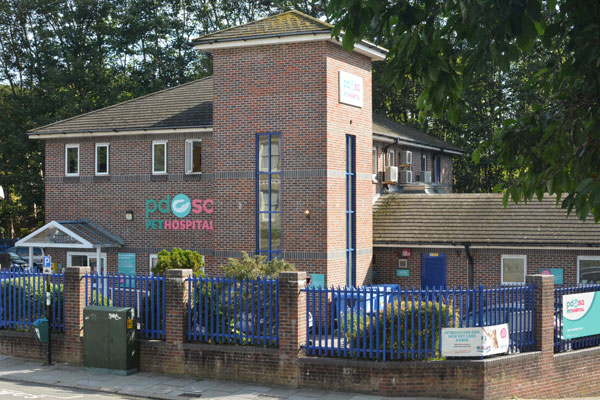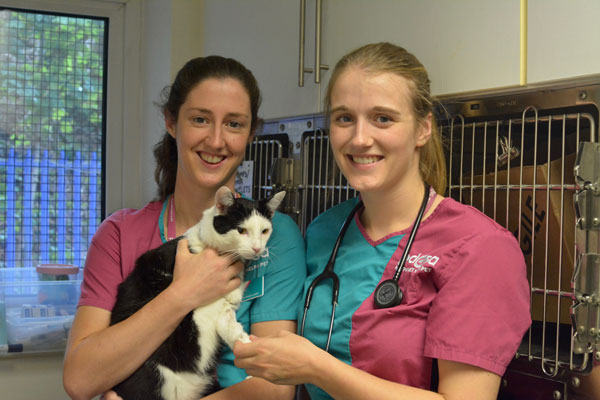Project Brighton: PDSA’s Brighton Pet Hospital is 25!

PDSA’s Brighton Pet Hospital, which runs a busy service on Robertson Road, Preston Park, celebrated its 25th Birthday last month (August).
Every year Brighton’s Pet Hospital treats nearly 54,000 sick and injured pets, treating around 110 pets on an average working day. It costs over £1 million to run the hospital a year, but the veterinary charity receives no government funding and relies entirely on the goodwill of their supporters.
Vet Nurse at Brighton PDSA Pet Hospital, Chloe Greenland, said: “We’re all extremely proud of the life-saving work that takes place in our hospital every single day. Days can be tough and extremely busy but knowing we’re changing lives by helping the much-loved pets of people in need makes it all worthwhile.”
The Brighton Pet hospital celebrated its 25 years of saving sick and injured pets in need on Monday 20 August, during the national charity’s centenary year. In 1917, the charity’s founder, Maria Dickin, first set up a dispensary for sick animals of the poor in London’s East End. Over the following years its work spread in response to public demand and PDSA now operates 48 hospitals across the UK, supported by a national chain of 130 shops and a dedicated army of volunteers.
A brief history of PDSA in Brighton
From the first basic dispensary in London’s Whitechapel, Maria Dickin took PDSA to other towns and cities by way of a horse drawn ambulance, treating animals and educating adults and children in the proper care of them. During the 1920s and 30s motorised dispensaries were covering up to 80 miles each day and permanent clinics were being established in towns and cities countrywide, of which Brighton was one.
The first mention of a PDSA site in Brighton was in the 1927 Annual Report, listed as 47b Portland Street, and an additional premises was opened in 1928 at 93 Upper Lewes Road. In 1930 the Portland Street site was moved to 3 Lower Bedford Street and remained open until around 1943.
We’re all extremely proud of the life-saving work that takes place in our hospital every single day
In 1932 the Upper Lewes Road site was moved to 16 Oxford Street where it remained as PDSA’s main centre in Brighton for many years. A third site was launched in 1937 in 3 Montague Place, then this was moved to 42 Station Road in around 1951. The site is believed to have remained open until around 1993.

In 1978 the main Oxford Street site was developed – the premises were enlarged and modernised to accommodate a shop at 16 Oxford Street and a veterinary centre next door at 14/15 Oxford Street. The case load in the final 12 months was just over 34,000.
In 1993 the current Pet Hospital was opened at 2 Robertson Road, and the Oxford Street and Station Road premises closed. All PDSA resources were moved to the new state-of-the art building, which houses six consulting rooms, two operating theatres, x-ray and isolation facilities, and recovery kennels for both cats and dogs.
In 1998 the dedicated team provided more than 36,000 free treatments, including 1,200 surgical procedures. In 2011 the building was partially refurbished, to update and further modernise the facilities. The hospital has recently benefited from a refurbished reception area.
Local support
PDSA has received large amounts of support from the local community over the years. Mrs Olive Taylor began collecting tin cans and scrap metal for PDSA in 1968 and continued to do for more than 30 years, eventually presenting PDSA with a cheque for £30,000 in 2001. She has made several further donations to PDSA over the years.
In 2001 bikers held a rally of over 100 Brighton motorcycle club members who took part in a sponsored ride from Box Hill to Brighton PDSA, in honour of the late Mary Eales, raising over £1,500.
In 2005 Jean Kettle was also named as PDSA Volunteer of the Year. Jean is a lifelong supporter of PDSA and started volunteering in 1975 to thank PDSA for treating her pets. In total she has helped raise nearly £90,000 for PDSA.





















